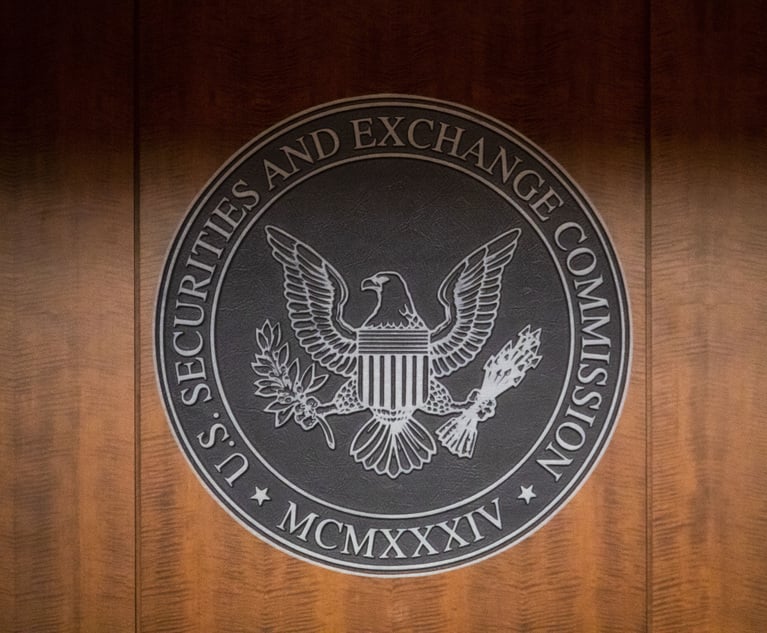The U.S. Securities and Exchange Commission's whistleblowerprogram reached a milestone on Aug. 30.
|Five years after the program was created under the Dodd-Frankfinancial reform law, the second-largest bounty in thewhistleblower office's history pushed the awards total past the$100 million mark—and the SEC was ready to celebrate.
|In addition to theannouncement of the day's more than $22 millionaward, the SEC issued a separatepress release in which SEC Chairwoman Mary Jo Whitedescribed the whistleblower program as a “game changer for theagency in its short time of existence.”
|Ever since, the whistleblower office's website has been adornedwith a green rectangle boasting that “Whistleblower Awards Top $100Million.” But that number—$100 million—tells only part of the storyfor the year that the SEC's whistleblower office hit full stride.Here's a deeper look into the numbers behind the program's bigyear.
|$500 Million
As White said in August, the whistleblower program has provenitself a game changer for the SEC's enforcement efforts. The SECtraces more than $500 million in ordered sanctions backto whistleblower tips.
|Andrew Ceresney, the SEC's enforcementdirector, saidin September that '“whistleblowers provide aninvaluable public service, often at great personal and professionalsacrifice and peril.”
|“I often speak of the transformative impact that the program hashad on the agency, both in terms of the detection of illegalconduct and in moving our investigations forward quicker andthrough the use of fewer resources,” he said. “The success of theprogram can be seen, in part, in the over $107 million we have paidto 33 whistleblowers for their valuable assistance, in cases withmore than $500 million ordered in sanctions. But it can also beseen in my daily interactions with enforcement teams who when I askthe question of how an investigation began, often respond bypointing to a whistleblower.”
|Whistleblowers, acting as “force multipliers,” contributed to“record results” for SEC enforcement, said whistleblower lawyerJason Zuckerman in Washington. “You can't argue with the data.”
|$136 million
After crossing the $100 million mark, the SEC whistleblowerprogram hardly let up in its efforts to reward tipsters. BetweenSeptember and early December, the SEC awarded about $30 million inwhistleblower bounties, bringing the new total to morethan $136 million. Including a Dec. 9 award of more than$900,000, the program has now issued bounties to 37whistleblowers.
|In the fiscal year ending Sept. 30, the SEC awarded $57million—a total that topped what it had rewarded in all previousyears combined.
|$22.5 million
On Aug. 30, the SEC whistleblower program cleared the $100million mark in style with the second-largest award in itshistory—a$22.5 million bounty to a former Monsanto Co.executive who told the agency about improper accounting thatinflated the agrichemical company's reported sales of Roundup. Thataward came just shy of the maximum bounty he stood to receive forthe $80 million settlement Monsanto reached with the SEC inFebruary.
|Under the SEC's program, whistleblowers deemed crucial to asuccessful enforcement action are eligible to receive between 10and 30 percent of any resulting penalties that exceed $1million.
|“I think, to whistleblowers out there, it's indicative of thepotential reward that information that normally would be hidden andcovered up, or people would do nothing with, can lead to ifemployees with a conscience decide to take the initiative. It doestake initiative to do,” said Stuart Meissner, a whistleblowerlawyer who represented the former Monsanto executive.
|Meissner said the investigation took about six years alone,before the settlement.
|“He did have to go through a lot,” said Meissner, a former NewYork assistant attorney general who helped draft the original SECwhistleblower rules. “He obviously had to deal with, before evengoing to the SEC, bringing this up internally over the objectionsof his co-workers and supervisors.”
|7
The SEC cracked down this year against whistleblower retaliationand agreements that it viewed as potentially stifling tips.
|In June, the SEC punished Merrill Lynch & Co. for usingconfidentiality agreements that could have been read to prohibitemployees from voluntarily contacting securities regulators. Twomonths later, the SECreached settlements with two other companies overseverance agreements that required outgoing employeesto waivetheir ability to receive a whistleblower award.
|The SEC took seven enforcement actions in 2016 overseverance agreements or outright retaliation againstwhistleblowers.
|In a two-day span this week, the SEC fined a company $180,000for routinely using severance agreements that contained a broadnondisparagement clause that prevented outgoing employees fromcontacting regulators. Under the agreements, employees could becompelled to forfeit all but $100 of their severance for breachingthe clause, according to the SEC.
|The SEC finedSandRidge Energy Inc. on Dec. 20 for retaliatingagainst a whistleblower who raised concerns about how the oil andgas company was calculating its publicly reported reserves. Thecompany fired the whistleblower after determining that it couldfind a replacement “who could do the work without creating all ofthe internal strife,” according to the SEC.
|“It's something of a clarion call to firms to review carefullytheir severance agreements, and that the SEC is going to hold firmsto a high standard to ensure their severance agreements can't beread to impede or discourage current or former employees fromcommunicating directly with the commission, whether as a witness oras a whistleblower,” said Mark Cahn, a Wilmer Cutler Pickering Haleand Dorr partner and former general counsel to the SEC.
|2
After leading the SEC whistleblower program for five years, SeanMcKessy stepped down in July and handedthe reins to his deputy, Jane Norberg. She initiallyserved in an interim capacity before being named McKessy'spermanent replacement in September. Norberg becamethe second director of the whistleblower program.
|Ceresney framed the selection of Norberg as an implicitendorsement of the whistleblower program's performance during thepast five years.
|“In its short history, our whistleblower program has had atransformative impact on our agency, and Jane has played asignificant role as deputy of the Office of the Whistleblower,” hesaid in a statement. “I am proud of the program's accomplishments,and I know that Jane will continue to ensure the program is a gamechanger for years to come.”
|1
Whistleblowers don't always leave the SEC happy. Sometimes, theyfeel they deserved a bigger bounty. In other cases, they're deemedunworthy or ineligibleof any reward. In one case this year, awhistleblower went public with his dissatisfaction—and in the eyesof many tipsters, he was one of the lucky ones.
|Eric Ben-Artzi, a former Deutsche Bank risk officer, said herefused to accept his part of a $16.5 million whistleblower award.Ben-Artzi criticized regulators for not going after the seniorexecutives responsible for the false accounting he exposed atDeutsche. Instead, he said, the SEC reached a $55 millionsettlement with the bank that would ultimately hurt shareholders.In a column in the FinancialTimes, he blamed the “revolving door” between Deutsche andthe SEC.
|InsideCounsel
Complete your profile to continue reading and get FREE access to Treasury & Risk, part of your ALM digital membership.
Your access to unlimited Treasury & Risk content isn’t changing.
Once you are an ALM digital member, you’ll receive:
- Critical Treasury & Risk information including in-depth analysis of treasury and finance best practices, case studies with corporate innovators, informative newsletters, educational webcasts and videos, and resources from industry leaders.
- Exclusive discounts on ALM and Treasury & Risk events.
- Access to other award-winning ALM websites including PropertyCasualty360.com and Law.com.
*May exclude premium content
Already have an account? Sign In
© 2024 ALM Global, LLC, All Rights Reserved. Request academic re-use from www.copyright.com. All other uses, submit a request to [email protected]. For more information visit Asset & Logo Licensing.







